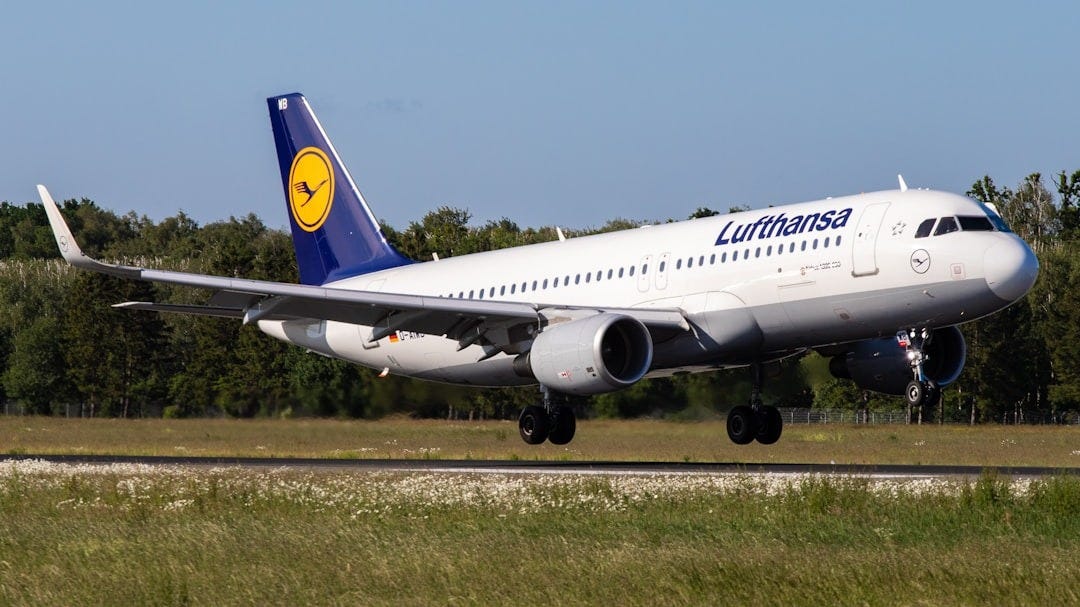Germany Airline Reports Lowered Financial Forecast
Lufthansa Lowers Forecast Amid Struggles to Break Even.

Disclaimer: The following article is based on information available as of the date of publication. It reflects the financial performance and strategic decisions of Deutsche Lufthansa AG during the first half of 2024. It does not contain any investment advice or commercial promotions. For the most accurate and updated information, please refer to Lufthansa's official communications and financial disclosures.
Real-time information is available daily at https://stockregion.net
Deutsche Lufthansa AG, the parent company of Germany's flagship airline Lufthansa Airlines and other subsidiaries, has revised its annual financial forecast downward. This adjustment comes in the wake of a challenging second quarter that saw the airline struggling to achieve break-even status due to market adversities and delays in aircraft deliveries.
In the second quarter of 2024, Lufthansa Airlines reported a profit of only €213 million ($232 million), a drop compared to the €515 million earned in the same period last year. This decline in profitability has had a broader impact on the Lufthansa Group, resulting in a net loss of €427 million for the first half of 2024. By contrast, the group had recorded a profit of €149 million during the first half of 2023. The reduction in profitability was attributed to lower ticket revenues, particularly for travel routes to Asia, operational inefficiencies, and delays in receiving new aircraft. Despite these setbacks, other entities within the Lufthansa Group, including certain passenger airlines, Lufthansa Technik, and Lufthansa Cargo, are expected to perform in line with the previous year's results.
Initially, Lufthansa Group had targeted an operating profit of approximately €2.2 billion for the entire year. Given the recent financial performance, the group has now adjusted its expectations to an operating profit range between €1.4 billion to €1.8 billion. The group's adjusted earnings before interest and tax (EBIT) for the second quarter amounted to €686 million, down from €1.1 billion in the corresponding quarter of the previous year.
In response to these financial difficulties, Lufthansa has initiated a comprehensive savings program aimed at reducing material costs by 20% across the board. Additionally, the airline has imposed a staffing freeze in administrative roles and decided to postpone, reduce, or cancel all non-essential projects. These measures are part of an effort to potentially achieve break-even status by the end of the year. Lufthansa's CEO, Jens Ritter, acknowledged the challenges in reaching the break-even point in a mandatory disclosure issued to investors through the stock exchange. He emphasized that the market for airline ticket sales has largely normalized following a post-pandemic sales boom. Nevertheless, competitors have been more aggressive in expanding their services, putting pressure on Lufthansa's profitability, even on traditionally lucrative long-haul flights to Asia and across the Atlantic.
Market Dynamics and Structural Changes
The competitive landscape in the aviation industry has been evolving rapidly. According to Ritter, Lufthansa is experiencing a "new reality" characterized by a structural change rather than a crisis. One notable shift is the decline in business travelers, a segment that previously contributed to Lufthansa's revenue. The gap left by business travelers has not been adequately filled by leisure travelers, whose demand is more seasonal and less consistent throughout the year. Ritter highlighted that Lufthansa's current operational system offers limited flexibility to compensate for these seasonal fluctuations in demand. This structural change poses a challenge for the airline, necessitating adjustments in strategy and operations.
Carsten Spohr, the CEO of Lufthansa Group, has expressed his concerns regarding the current state of affairs. In communications reported by the financial newspaper Handelsblatt, Spohr conveyed to employees that the situation is not meeting the company's expectations. He pointed out that Lufthansa Airlines is currently operating 20% fewer flights than before the COVID-19 pandemic, yet it retains the same number of employees as in 2019. This mismatch has resulted in a 20% reduction in productivity, exacerbating the financial strain on the airline.
Deutsche Lufthansa AG faces a challenging period marked by decreased profitability, operational inefficiencies, and competitive pressures. The company's revised financial forecast and cost-saving measures reflect its efforts to navigate this difficult landscape and strive for break-even status by the year's end. The evolving dynamics of the aviation market, particularly the shift in business travel patterns, necessitate ongoing adjustments and realignments for Lufthansa to maintain its position in the industry.
Disclaimer: The content provided in this article is for informational purposes only and should not be construed as financial or investment advice. The performance and strategies of Deutsche Lufthansa AG discussed herein are based on data available as of the date of publication. Always refer to official sources and consult with financial professionals for the most accurate and up-to-date information.
Real-time information is available daily at https://stockregion.net


